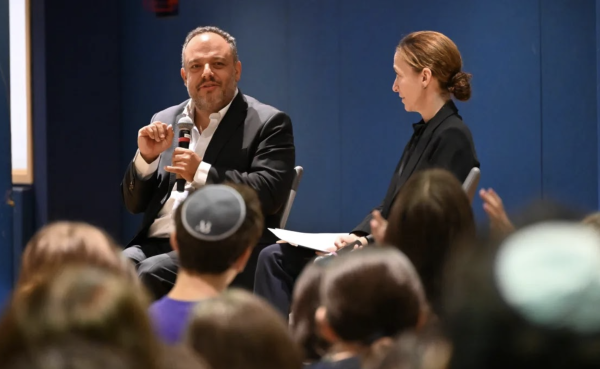For many students, Australian-Israeli lawyer and diplomatic advisor Tal Becker’s visit to our high school was monumental, in itself. But it was his calculated, intelligent and thoughtful responses that have stuck with me for the past few weeks, earning him a spot in my personal cannon of modern day Jewish heroes.
Tal Becker began his interview with this key phrase, laying out the nature of the conflict: “The premise of this war is one of fighting those who try to take away the possibility of peace.” Within our arguably ignorant Western world obsessed with polarizing issues and assigning political agendas to everything, Becker reminds us that it is necessary to take a step back and consider the simplicity of this matter. He emphasized our ethical code and inner moral compass should be the only thing guiding our decision about this conflict. Violence and terrorism, he argued, should not be viewed with nuance nor through a political lens. Instead, we must take a firm stance on issues that align with our values.
Tal Becker also noted that “change does not happen in the negotiation room; it happens on the streets of our societies.” It struck me that a man who participated in the fruition of the 2020 Abraham Accords still recognized he was one piece of a larger puzzle. He showed humility and exemplified admirable awareness of the importance and the critical role public consensus and attitude plays in political change. One cannot function without the other in alignment. Thus, we have the responsibility, not just lawmakers to make societal strides. We have to be conscious and intentional, and take on changemaking as a personal goal.
Midway through his interview, Becker recalled the night before his International Court of Justice statement, where he refuted South Africa’s claim that Israel is committing genocide within the Gaza Strip. He described the experience as “sickening,” expressing how the audacity of the allegation itself, along with its insurmountable implications, was absurdly unsettling. Becker highlighted how a stance declared by the United Nations or by the I.C.J. can stick, sway, and shape the perceptions of the international community influencing societies and governments at large.
Becker’s words reminded me that we find ourselves in the unique age dominated by social media, where everyone follows what is “in” – catchphrases, perspectives, etc. Recently, Jews have been on the receiving end of criticism across party lines, since Israel is “out.” Accordingly, Becker, who served in the negotiation room emphasized how vital it is to change the public impression and invest our efforts in gaining UN and ICJ support to create actual political change in the Jewish favor. These non law-making organizations, whose values are often diminished within our community, are rather pivotal, no matter how much they have wronged us these past few years.
In terms of looking forward to a peaceful future in the Middle East, Becker said, “Like it says in Pirkei Avot…it is in the Jewish spirit to debate. Nonetheless, we must remember we do not know all the answers.” Though the unknown seems uncomfortable or scary, Becker calls us to action with moral clarity, urging us to take on societal responsibility. Current methods, he relayed, are obviously not working, so we must continue engaging in dialogue with fresh perspectives and an open mind to reach an urgent solution.
